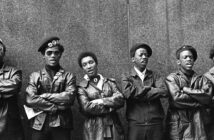By Khalid Rudo Smith,
Word in Black
For some time, we’ve all held our breath as a tech billionaire, who made questionable moral compass attempts in the past, has purchased Twitter — one of the most important free speech platforms on the planet.
Many, particularly in the Black community, have seen far more hate speech, censorship, and online activity with real-world impact. But with little to no control over a billionaire or government regulators and little to no equity in the institution that affects us so greatly, we just have to watch and see.
Without equity, Black people must protest, petition, trust, or teach others to remove barriers to our pursuit of happiness. While this equity industry has experienced a boom in recent years, we can’t afford for this to remain our primary strategy and expect anything more than the sluggish cycles of progress and backlash that’ve made progress only measurable in terms of generations.
My parents did equity work. My grandparents did equity work. I don’t want my grandchildren to know what equity work is.
The irony is that “Black Twitter” is a healthy and active community that is undoubtedly valuable as a hub of culture and creativity — and that makes the platform so relevant. But there’s almost zero discussion of Black Twitter deciding en-mass to take their culture and creativity to another platform of their own choosing or creation.
That’s the problem I’m interested in: How the Black community addresses the issue of not having equity in the institutions that shape our future.
In my work as a community builder and facilitator of communities focused on innovation and equity, I’ve been fortunate enough to engage leaders building the future with questions of ethics, access, or equity. In each case, the well-meaning entrepreneur leader made a solemn promise of equitable behavior and pointed to their user agreements and privacy policy.
So if Black Twitter must accept what it cannot change (who owns Twitter), then we should change what we’ll accept. Equity is ownership. Fairness is a policy. Possessing equity means having the power and agency to pursue options that ensure one’s survival and safety and align with one’s aspirations. Equity is the power to set and change policy.
A Twitter board with a significant portion of Black ownership might have had a very different discussion when considering the offer from Mr. Musk — or anyone else. We cannot continue to accept that a company will act in ways that are equitable towards us when injustice is always one executive decision away.
The Black community should be focused on building equity in the entities molding the future. And yes, I’m aware that might just require a revolution.
Luckily, there is a social, cultural, and economic revolution occurring right now known as web3.
Powered by cryptocurrency and blockchain, Web3 enables new organizational structures that allow communities to form and function without centralized control and share in the collective economics of their efforts. This isn’t the hype train of slapping metaverse on your corporate earnings report and has nothing to do with the price of cryptocurrency. Just like web 1.0, we’ll have to sort through the pets dot coms, gateways, and myspaces before the Amazons, Apples, and Instagrams arrive. But arrive they will — the revolution is inevitable, but it will only be revolutionary if developers, consumers, and contributors are intentional about demanding real equity.
Our current age, Web2, has been marked by the rise of huge platforms where the largest capital investors are communities of users with no equity to speak of. Think: Uber owns no vehicles, Facebook creates no content, Alibaba and Amazon barely touch inventory, and Airbnb owns no real estate.
On each of these platforms, it’s the community that’s really creating value. A few creators or power users benefit monetarily, but for most users, the platform is extractive. Concerns of safety and privacy are managed with promises of equitable outcomes and “not being evil,” and concerns about historic injustice that they may have an opportunity to correct generally fall on deaf ears.
The revolution of Web3 starts with the fact that the community comes first and predates the company and product. The community decides what it wants to do, how it will make decisions, all of the jobs it needs done to be successful, and the compensation for each of those jobs. Future equity is established when members author the rules that will award additional equity to those that help the community succeed.
Web3 doesn’t enable better ways for users to rent an unoccupied room, keep in touch with friends, or self-publish. Web3 is a revolution in ownership and participation, in who gets to set the rules, who has to ask for equitable outcomes, and who, from the beginning, has inalienable rights of equity. The strongest communities with the most passionate users will create the most attractive incentives and be the winners of Web3.
Much has been written about how Web3 will or will not be an eliminator of inequality, and I agree with both sides. Black entrepreneurs must be represented in the communities launching Web3 companies and present when companies are figuring out how to fairly reward the creative class and other groups more likely to be Black with equity for their contributions.
A community-first approach to securing a place in the future for everyone starts with building a Black community dedicated to equity through innovation. And yes, I mean Black leaders, not leaders of color or BIPOC or women and minorities. There are already communities of Black leaders who are thoughtful, humble, and have a track record of dedication to their neighborhoods and uplifting other people. Likewise, there are communities supporting pioneering entrepreneurs of color.
But because the master’s tools will never dismantle the master’s house, these groups have an opportunity to come together and experiment with new types of cooperative and collective innovation. Why can’t we build institutions collectively owned and dedicated to our collective good?
Together we might have such an impact on the future that one of our collective and greatest aspirations is within reach. Our grandchildren might be able to follow their dreams uninterrupted and be free from having to confront any vestiges of systemic inequity. They might be able to leverage their God-given talent and pursue happiness however they define it. That’s the future we’re building.
Help us Continue to tell OUR Story and join the AFRO family as a member –subscribers are now members! Join here!



